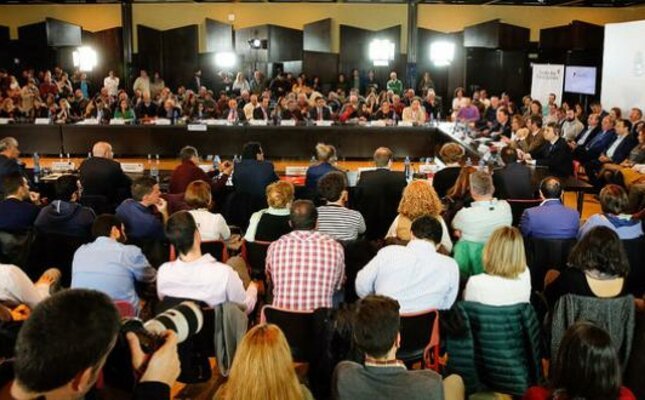The Socialist International Mediterranean Committee held a meeting in Malaga on 16-17 December 2016, hosted by the Spanish Socialist Workers' Party (PSOE), focussing its discussions on “The current challenges to ensuring democracy, freedoms, rights, and peace in the Mediterranean” and “Strategies for reaffirming our vision and values in the Mediterranean region”. Participants in the debates included delegates from Algeria, Cyprus, France, Greece, Israel, Italy, Lebanon, Mauritania, Morocco, Montenegro, Palestine, Spain, Tunisia, Turkey, Western Sahara and Syria, who contributed different perspectives on these themes, reflecting the diversity and complexity of the region while at the same time the values and principles that unite us in the Socialist International.
In the opening session of the meeting participants were addressed by Mario Jiménez, Spokesperson of the governing commission of the PSOE and responsible for organisation, who extended a warm welcome to all participants; by the SI Secretary General Luis Ayala, and by Ricardo Cortés, member of the governing commission of the PSOE responsible for Foreign Affairs, who chaired the meeting.
Introductory speeches to the main themes were given by Mustapha Ben Jaafar from Ettakatol, Tunisia, an Honorary President of the SI, and by SI Vice-Presidents Ahmed Ould Daddah from the RFD Mauritania and Umut Oran of the CHP, Turkey.
A high priority in the discussions was given to developments in Syria, to the dire situation of the people of Aleppo, and the international community’s failure to prevent or mitigate the humanitarian disaster that continues to unfold. It was highlighted that while almost 5 million Syrian refugees had sought shelter in neighbouring countries, most of the European countries had failed to fulfil their commitments, quite apart from their moral and legal obligations. It was also observed that the strictness with which the austerity measures were applied by the EU, which did so much damage to the region as a whole, was not matched by the same strictness in regard to the agreed cuotas for migrants, noting at the same time that there was an evident need for the European Union to return to its founding values.
Six years on from the so-called Arab Spring, major setbacks in democracy and fundamental rights were observed in the countries affected, although Tunisia still offered a promising example.
The recent increase in terrorist attacks was a cause of grave concern, which all participants resoundingly condemned, and the need to tackle the causes of radicalism was underlined. Concern was also expressed over the loss of basic human rights resulting from security measures taken in a number of countries to counter terrorism.
Various conflicts affecting the region, both old and new, were discussed with parties directly concerned. In this regard, the Committee agreed on a series of proposals to achieve a fair Mediterranean Pax, which are outlined in the declaration subsequently adopted by the meeting.
Cause for optimism was seen in the situation of Cyprus where negotiations due to continue in January looked hopeful for providing a bi-zonal solution to that long-standing conflict and the committee was unanimous in its support for the process underway, which if successful would bring hope to others in the region as a good example of political coexistence in peace.
The agenda also included a discussion on the national situation in the different countries of the region, which offered the opportunity for participants to share information on the current realities in their respective countries, on work of their party, and the challenges ahead.
The Committee then adopted the Declaration: “A call for hope against resignation: For greater solidarity with refugees, towards the 'Mediterranean Pax’ ”, reflecting the key points of the discussion.
Following these debates, Ricardo Cortés inaugurated a special closing session in which the Committee was joined by Susana Díaz, President of the government of Andalucía and Secretary General of the PSOE-Andalucía. In her address, Susana Díaz pointed to the rich diversity of the peoples and countries that made up the Mediterranean basin and underlined the need for consolidating democracy, improving the economy and for the EU to coordinate a plan for migrants and refugees, particularly minors arriving without supervision. She stressed that we are not just socialists but also internationalists, and our strength lies in our values and ideas.
The SI Secretary General, Luis Ayala, touched on the key elements that dominated the discussions of the Committee and highlighted the crucial issues of Peace, Equality and Solidarity, which would form the basis of our discussions at the forthcoming SI Congress to be held in Cartagena, Colombia, in March 2017. He also looked forward to the taking office of the new Secretary General of the United Nations, António Guterres, a person we all identified with as socialists and who would have all our support in the complex work ahead of him.

